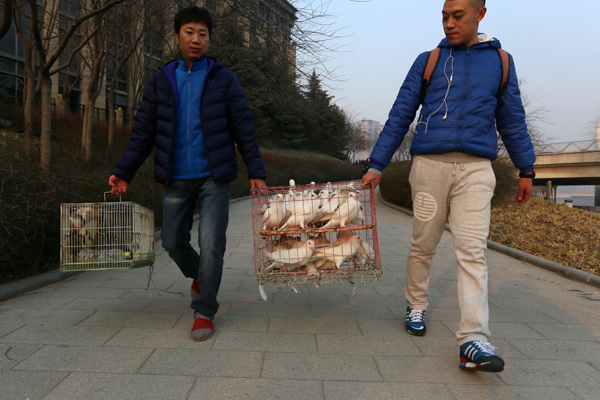Release of animals into the wild threatens ecosystem
Updated: 2016-05-10 08:21
By Xinhua In Kunming(China Daily)
|
|||||||||
 |
|
Two residents of Henan province prepare to free animals.[Provided to China Daily] |
Releasing into the wild what they perceive to be captive animals is a Buddhist practice with a long history in China, and one that is now mired in controversy.
Micro-blogger "cora liebo" regularly posts lists of animals "released" in the southwestern province of Yunnan - lists that have made jaws drop all over China.
One such posting in April listed bedbugs among the creatures released, along with 58 kilograms of snakes.
Such releases have been going on for years, and have included many bizarre species that are alien to Yunnan, including the notoriously invasive apple snail, which has caused severe damage to rice crops throughout Asia.
Rao Dingqi, an entomologist with the Chinese Academy of Sciences, is worried that the release of alien species will seriously damage Yunnan's fragile ecosystem.
"Taking golden apple snails as an example, it is a species from South America that has a strong adaptive and reproductive capacity," he said. "It will damage the paddy-field ecology, affect the growth of crops and reduce the population of native species, perhaps even to extinction."
The forest public security bureau in Kunming, the provincial capital, is investigating the case.
The idea of releasing animals into the wild dates back to the Han Dynasty (206 BC-220 AD). The practice is thought to cultivate kindness, compassion and benevolence, and became popular when Buddhism was introduced to China.
A media report last month said that more than 300 foxes and raccoon dogs had been released without authorization in a suburban area of Beijing. Local people later complained that foxes had attacked their chickens.
According to Chinese law, people need authorization before freeing wild animals, and the environment must be suitable for the animals' survival.
All the foxes and raccoon dogs released in the recent incident were reportedly raised in captivity. The bureau subsequently recovered more than 100 foxes, most of which were already dead, many from starvation, because the animals were not equipped to survive in the wild. Rao believes such releases should not be done irresponsibly.
"Releasing animals cannot be done blindly," he said. "It is important to know about the animals' habitat and biological nature, and to release them only in a place where they can survive."
Kunming police believe the unregulated releases there have given rise to a black market in the trafficking and hunting of wildlife. More legislation is needed to stop these releases, along with heightened public awareness, Rao said.
When examining an amendment to the wildlife protection law during a session of the Standing Committee of the National People's Congress on April 27, committee members suggested China should improve its supervision of animal releases.
Related Stories
Wildlife getting better treatment in Jilin 2016-04-11 15:59
Prince William and Kate visit India's wildlife hotspot Kaziranga 2016-04-14 11:11
Ivory burning won't increase price: Kenya wildlife chief 2016-05-06 02:16
Ivory poachers must be punished to raise awareness of wildlife protection 2016-03-28 07:44
Abbot seeks Life-Cherishing Day to protect wildlife 2016-03-15 07:51
China, US team up to help wildlife 2016-03-04 12:00
Today's Top News
London's mayor an exception to Muslim ban -Trump
China consumer prices up 2.3% in April
EU anti-dumping moves may damage ties with China
Search widens for leading overseas professionals
60% of career women say no to second child: report
Testing times
Big hopes as China hosts the G20
Inspectors to cover all of military
Hot Topics
Lunar probe , China growth forecasts, Emission rules get tougher, China seen through 'colored lens', International board,
Editor's Picks

|

|

|

|

|

|







